Chicory root tea is a herbal tea, and caffeine-free coffee substitute. Made with the roasted and ground roots of the chicory plant, the tea tastes quite similar to coffee. Learn how to make chicory root tea, for a delicious caffeine free hot beverage.

What Is Chicory Root Tea?
Chicory is a plant which is a member of the daisy family and dandelion family. The chicory plant belongs to the Family Asteraceae, and to the Genus Cichorium.
Chicory root tea is made from the roots of the chicory plant. The tea has a similar taste to coffee, and using this beverage is a great way to reduce caffeine consumption.
Other parts of the chicory plant can be used as well, including the flowers and the chicory leaves. It is mainly the roots however, that are used for the chicory tea.
The chicory plant is a perennial herb with bright blue flowers, which grows in many locations across the world.
Wild chicory, or Cichorium Intybus is native to Europe, Western Europe and Africa, however has been naturalized in many other locations, including North and South America, Australia, and New Zealand.
The wild chicory plant, also known as common chicory, grows as a weed in many locations. The plants are often seen growing in late summer and early fall, growing in open meadows and fields, and along the sides of roadways.
There are a number of different varieties of chicory which can be used to make this tea.
Wild chicory is just one option, as it is often easy to find and to harvest.
You can harvest wild chicory seeds if the plants are growing in a safe location, and bring the seeds home to grow some chicory in your garden.
The wild chicory plant is a great candidate to harvest for tea, and with a just a little effort, the roots can be dug, and harvested for use.

Using Chicory As A Tea
Chicory root tea, also known as chicory coffee, is a beverage that is made with the roots of the chicory plant. When roasted, the roots give the beverage a similar flavor to coffee, without the caffeine content.
Although often used as a substitute for coffee, the powdered chicory root has also been used as an additive to coffee, to reduce caffeine content.
This tasty tea or coffee is fairly easy to make, and well worth the effort. It's also a fun project to make your own homemade coffee, from plants which you can grow right in the garden.
Since wild chicory is often found growing wild, it's important be aware of safe harvesting techniques, if you plan to use the wild plant.
Always harvest in areas free of chemicals and pollutants, because if you are planning to consume the plant parts, you want to be sure that they are safe.

Chicory Root Tea Benefits
Chicory is a herbal drink, known for it's use in traditional medicine, and as well for it's culinary use.
Some of the potential health benefits of chicory root tea include it's use as an aide to improve digestion, and digestive health, and as well for it's anti-inflammatory effects.
Chicory root fiber has been found to contain beneficial compounds which have been studied and shown to have antioxidant, anti-inflammatory, and anti-microbial effects.
An article from the National Library of Medicine and PubMed Central, titled: Chicory: Understanding The Effects And Effectors Of This Functional Food, provides an inclusive and scientific summary of the beneficial compounds within the chicory plant.
Use of chicory can promote a healthy digestive system, help to regulate blood sugar, and promote digestion.
The roots of the chicory plant contain vitamins and minerals, as well as the compound called inulin.
Chicory root is a rich source of inulin, a prebiotic fibre, which helps with the regulation of the digestive tract.
Inulin has been used in the supplement industry as a natural prebiotic supplement, which supports gastrointestinal health.
The inulin acts as a food for the probiotic bacteria which are present in your gut.
The inulin is also a natural sweetener, and offers a sweet taste to the roots harvested early in the season. You can taste the sweetness when the roots are consumed.

Chicory Root Tea Side Effects
The inulin, a dietary fiber found within the chicory root, can sometimes lead to side effects with use.
These side effects include gas, bloating, and digestive discomfort in some people, especially those with digestive disorders, such as irritable bowel syndrome.
Individuals prone to these digestive symptoms should start their use of chicory tea in small amounts at first, to see their response to the plant.
Inulin in the chicory tea can also reduce blood sugar levels, which can cause hypoglycemia in some people. Therefore individuals with diabetes should be alert to this effect, and monitor their blood sugar levels if using the tea.

It's important to check with your physician or healthcare provider before consuming chicory root tea, if you are on medication or have a medical condition.
Who Should Not Drink Chicory Root Tea?
Chicory root tea is generally considered safe to drink for most people, and for the most part is not known to cause adverse reactions. However as with all foods, there are some people who should avoid using this drink.
Be aware of potential allergies.
Anyone with allergies to plants in the Asteraceae family should avoid the use of tea or coffee made with chicory roots. There are many plants in this family, including ragweed, daisies, marigolds, and chrysanthemums, just to name a few.
Individuals with allergies to plants in the Asteraceae family may be allergic to the chicory plant as well.
Symptoms of an allergic reaction can include hives, itching, swelling, and trouble breathing. Always seek medical attention if experiencing symptoms of an allergic reaction after use of chicory root tea.
Individuals who are being treated for diabetes should consult with their family physician before consuming this tea. This is due to the risk of blood sugar changes, and the risk of hypoglycemia.

How To Make Chicory Root Tea
Chicory root tea is a traditional drink which is made with the roots of the chicory plant. Any variety of chicory will do.
I grew some wild chicory specifically for harvesting the roots for tea.
These roots can be dug at the end of the first growing season, however are best if you leave them in the ground for another year.
I dug up some smaller roots, just to have a taste of the chicory tea, however will dig up a larger batch next season.
The fresh chicory roots are dug up, chopped, and then roasted. The roasting process gives the chicory root tea a dark, slightly bitter, and nutty flavor, similar to coffee.
Chicory root tea is a great alternative to coffee.

Harvesting The Roots
Where To Harvest
- Make sure to harvest the chicory roots from a location that is considered safe to harvest from.
- The location should be ideally organic, and free from pollutants, chemicals, and any road runoff.
When To Harvest
- The best time to dig the roots is in winter or in very early spring, when the leaves of chicory plants are not on the plant. At these times of year, the energy of the plant has returned to the roots.
- In our zone 5b garden, winter harvest is less likely, since the frost is still in the ground. In colder climates you will have to wait until the ground thaws.
- As well, if harvesting before the leaves are on the plant, make sure to correctly identify the plant before use.
- If possible, mark the plants in fall, therefore having safe identification of the leafless plant.
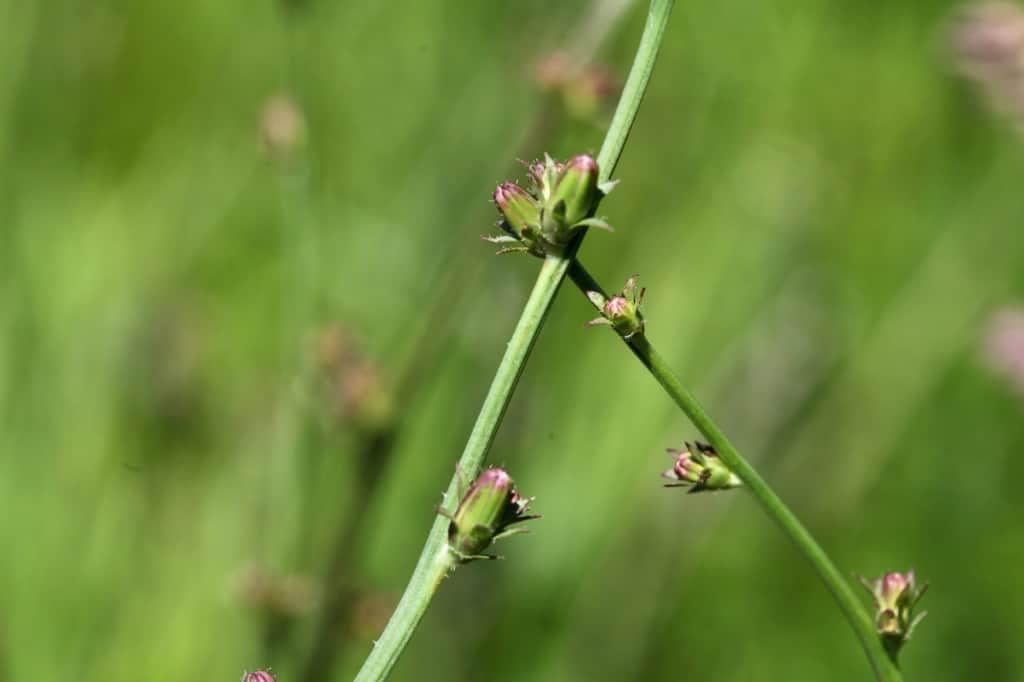

How To Harvest
- With a clean shovel, dig down around the plant, and pull up some of the chicory roots.
- Chicory is perennial, and if at all possible it's best to leave the plant to grow on, after harvesting just some roots. Another option is to dig up one plant, and leave others in the area growing.
- Even at the end of the first growing season, the young roots were carrot sized in width.
- When you have harvested some roots, bring them inside to prepare for roasting.

Roasting The Roots
- Prepare the roots by first giving them a good rinse, to remove the dirt from the root surfaces.
- Chop the roots into small pieces.
- Spread the chopped pieces of raw chicory root out onto a baking sheet, spreading the pieces out evenly.
- Place into the oven.
- Bake initially at 150°F for 2 hours, which will help to dry and dehydrate the chicory pieces.
- Then bake at 350°F for another 25 to 40 minutes, until the roasted chicory roots are brown and crispy.
- Check on the pieces after 25 minutes of baking, and then every 5 minutes thereafter, until the chicory is ready to be removed from the oven.
- Remove the roasted pieces from the oven, and allow them to cool down.
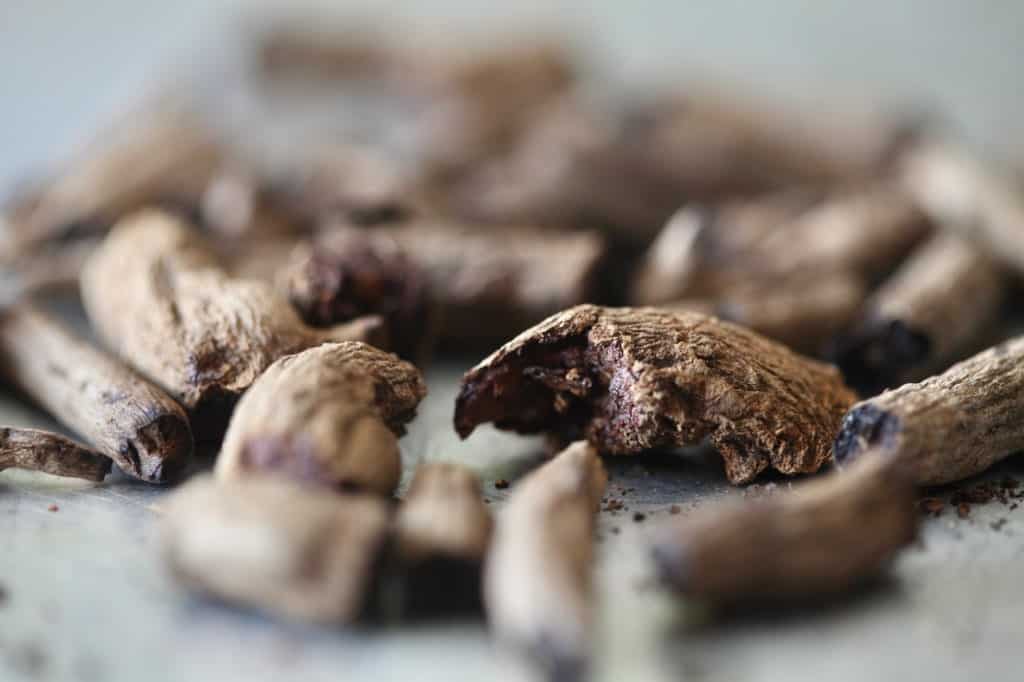
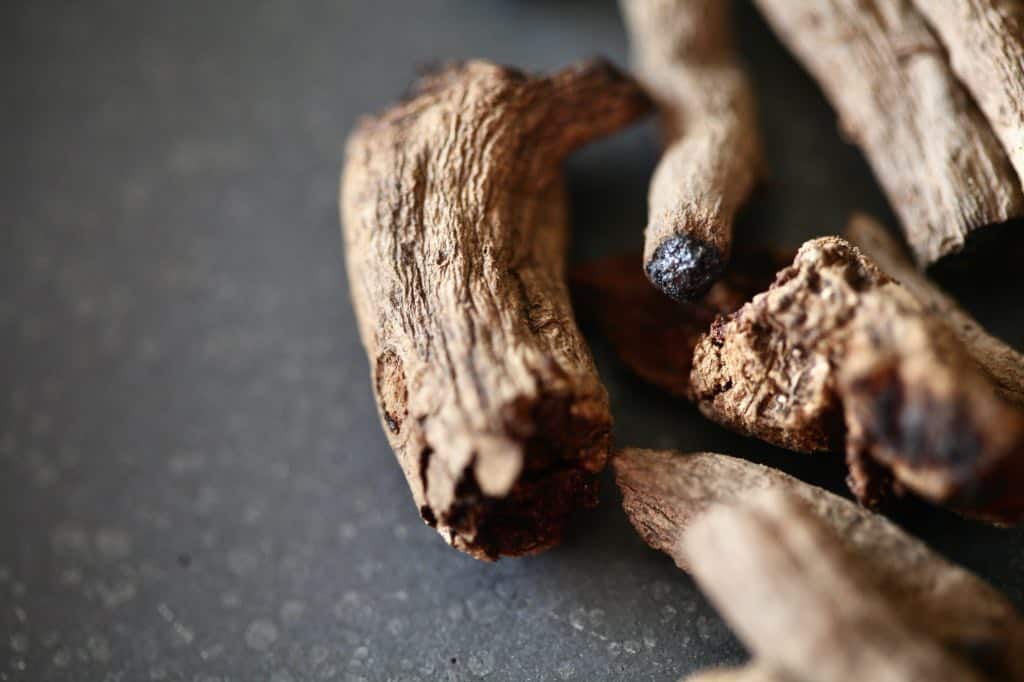
Grinding The Roots
- Once the roasted chicory root pieces have cooled, they can then be ground down into finer pieces. They can even be ground into a fine powder.
- To grind you can use a blender, or coffee grinder, or even a mortar and pestle.
- Once ground down into a powder, store in an airtight container.
- Make sure to label the roasted chicory with the name of the powder, and the date of storage.
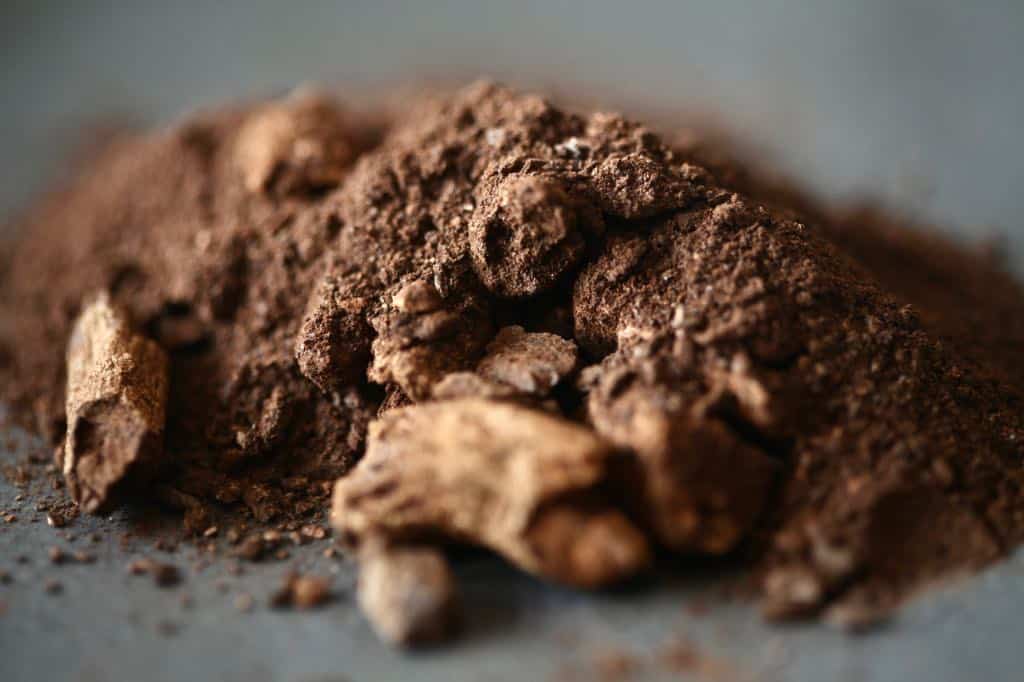
Making Chicory Root Tea
- Select 1 teaspoon to 1 tablespoon of roasted ground chicory root, depending on taste.
- Place the dried chicory grounds into a tea ball, tea strainer, or a reusable tea bag, depending on the fineness of the grind. You can also use a French press.
- For a very fine grind, use a reusable tea bag.
- Place into a cup and add hot water.
- Allow the tea to steep for approximately 5 minutes, to desired strength.
- Add cream, milk, or sweetener to taste.
- Sit back and enjoy.
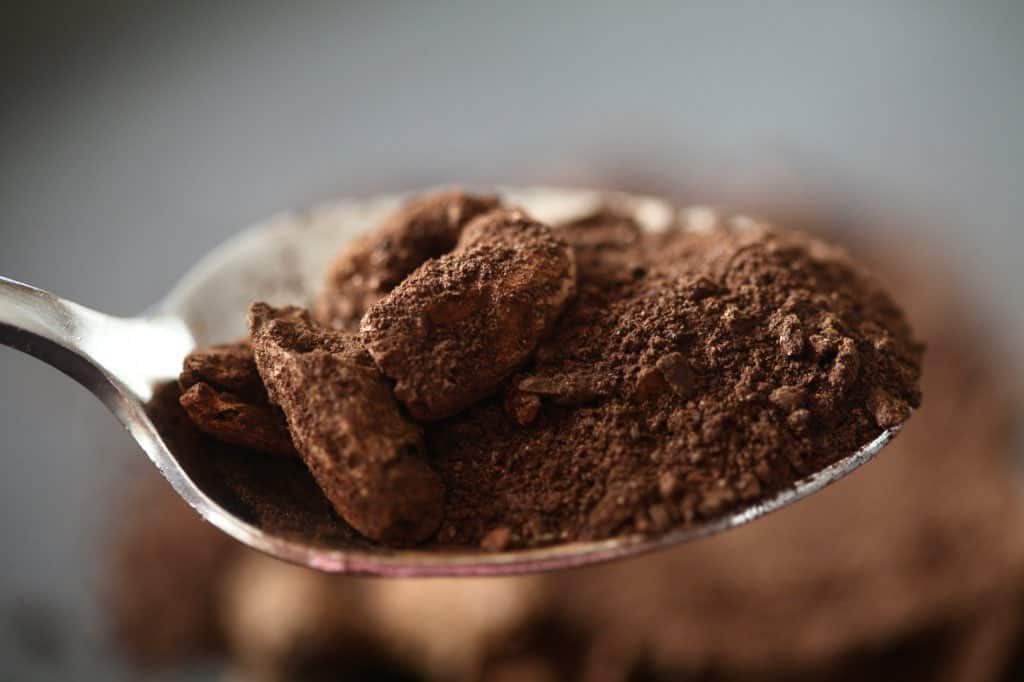
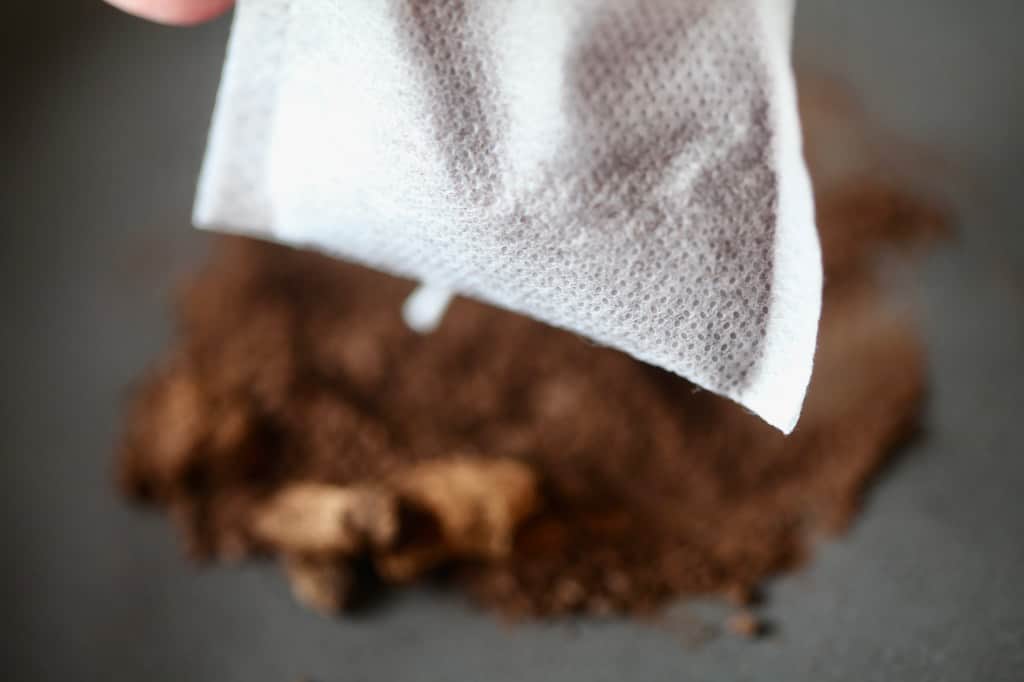
Substitutions:
- Consider adding some roasted dandelion root to the roasted chicory root when making the coffee.
- The dandelion roots can be prepared in the exact same way that the chicory roots were prepared.
- The flavor will be enhanced and earthy, for a delightful herbal tea.
- You can also add a cinnamon stick for additional flavor.
- Substitute cream for almond milk, and sugar for honey or maple syrup.

Frequently Asked Questions
Can You Drink Chicory Root Every Day?
For most people, drinking chicory root tea on a daily basis is generally considered to be safe. However if you have any concerns or underlying medical conditions, it's always best to consult with your health practitioner before consuming.
The tea (or coffee) has traditionally been used as a coffee substitute, and therefore can be used daily. This caffeine-free alternative to regular coffee is reported to have a number of health benefits, including improving digestion, along with anti-inflammatory effects.
If you plan to drink the tea on a regular basis, start slowly, and gradually increase the amounts consumed over time. This way you can see how your body responds to the tea.
Always use a good quality tea, harvested from an organic location.

What Does Chicory Root Tea Taste Like?
Chicory root tastes similar to coffee.
Chicory root tea has a slightly bitter and roasted taste, just like that of coffee. The flavor of chicory can often enhance the flavor of coffee once added, giving it a fuller roasted taste.
I find the flavor of this tea pleasantly delicious, tasting similar to coffee, and somewhat similar to cocoa.
If you place a cinnamon stick into the tea, there will also be a slight cinnamon flavor as well.
When the chicory roots are roasting, the kitchen fills with the aroma of the roasted roots. The aroma smells much like a chocolatey dessert baking in the oven.
Chicory root tea tastes just like it smells when it's roasting.

Does Chicory Root Tea Have Caffeine?
Chicory root tea and chicory coffee is caffeine free. It is a great coffee substitute if you are trying to decrease caffeine consumption.
The tea can be consumed just like you would have your usual hot beverage. The powdered root can also be added to the coffee, to reduce the caffeine content.
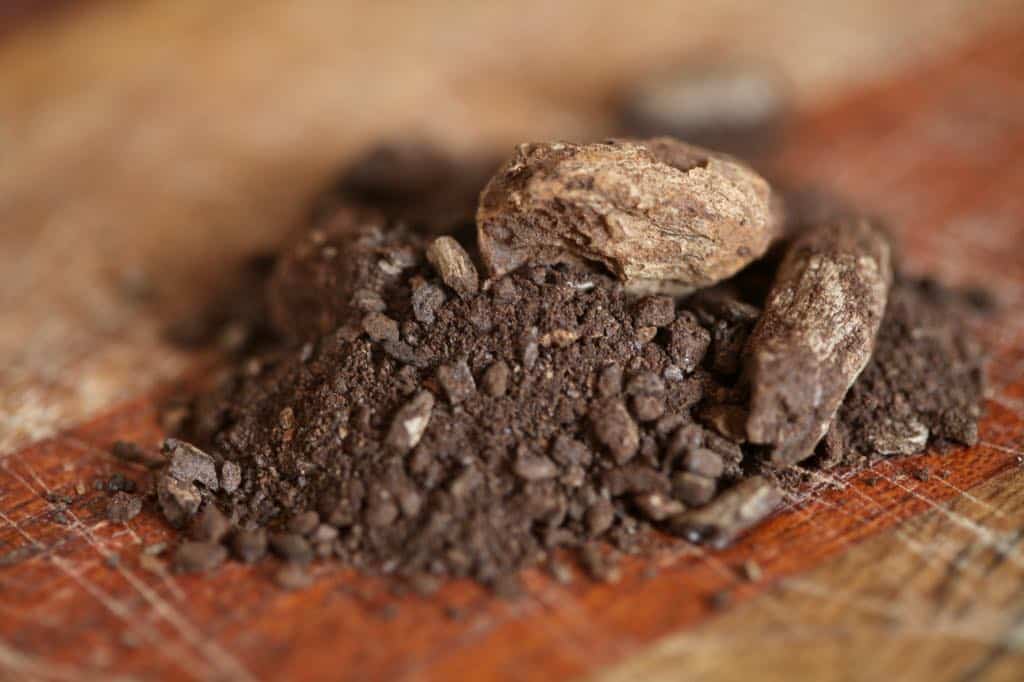
Conclusion
If you love coffee, and are trying to reduce or eliminate your caffeine intake, consider using chicory root tea, also known as chicory root coffee.
The tea can also be used as an additive, adding some to your morning cup of coffee to reduce the caffeine amounts.
Who knows, chicory tea may become a beverage of choice, with it's coffee-like taste and contribution to digestive health, along with other additional benefits.
Try growing some chicory in the garden this season, so that you don't have far to travel, to harvest the roots of the plants.


RECIPE: Chicory Root Tea (Or Coffee)
Chicory root tea is a herbal tea, and caffeine-free coffee substitute. Made with the roasted and ground roots of the chicory plant, the tea tastes quite similar to coffee. Learn how to make chicory root tea, for a delicious caffeine free hot beverage.
Ingredients
- 1 teaspoon to 1 tablespoon of roasted ground chicory root
- 1 to 2 cups boiling water
- milk or cream (optional)
- cinnamon stick (optional)
Instructions
- Harvest and wash the chicory roots.
- Bake the roots in the oven at 150°F for 2 hours, then at 350°F for 25 to 40 minutes.
- Grind the roasted roots with a blender, or coffee grinder, or even a mortar and pestle.
- Select 1 teaspoon to 1 tablespoon of roasted ground chicory root, depending on taste.
- Place the dried chicory grounds into a tea ball, tea strainer, or a reusable tea bag, depending on the fineness of the grind. You can also use a French press.
- For a very fine grind, use a reusable tea bag.
- Place into a cup and add hot water.
- Add cream, milk, or sweetener to taste.
- You can also add a cinnamon stick for additional flavor.
- Substitute cream for almond milk, and sugar for honey or maple syrup.
- Sit back and enjoy.
Notes
Be aware of potential allergies. Anyone with allergies to plants in the Asteraceae family should avoid the use of tea or coffee made with chicory roots.
Individuals who are being treated for diabetes should consult with their family physician before consuming this tea. This is due to the risk of blood sugar changes, and the risk of hypoglycemia.
Other Posts You May Like:
PIN IT FOR LATER!








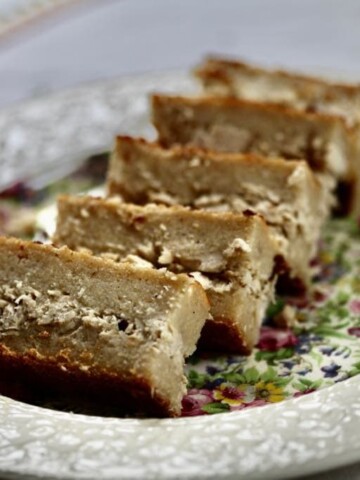

Leave a Reply